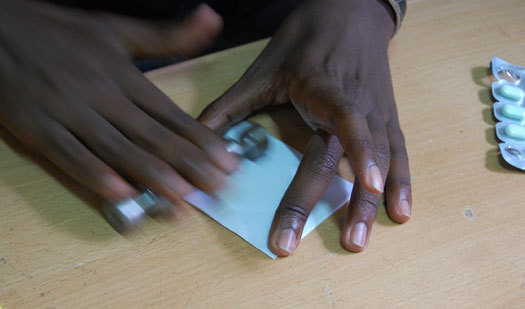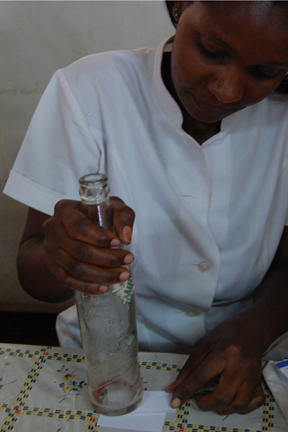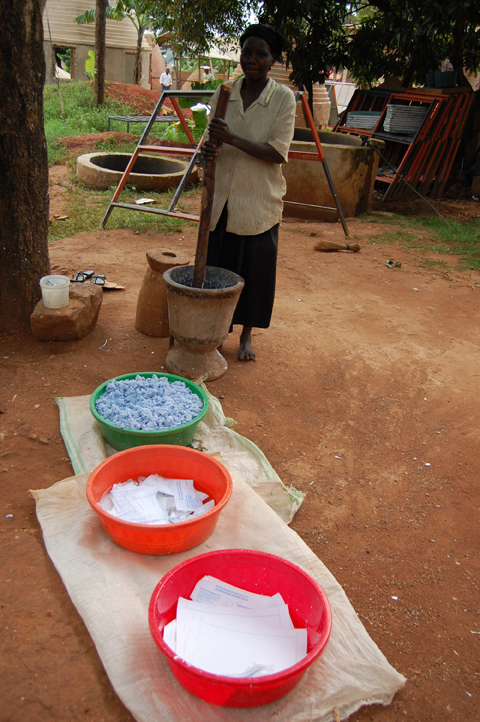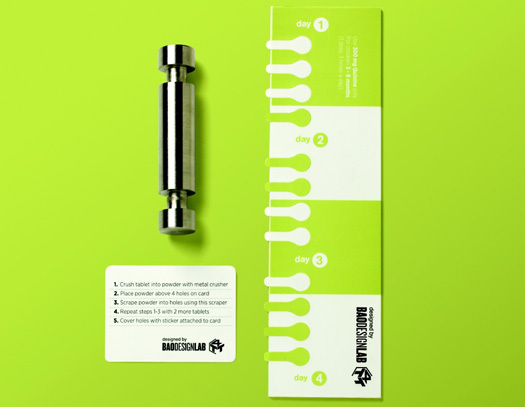
The Project Dose medicine crusher produced by T4T in Uganda. Photo: Linda Pulik
Hospitals and healthcare facilities in developing countries face problems ranging form overcrowding to underfunding and a lack of available staff, medical equipment and supplies. One lesser-known issue is the limited availability and high cost of obtaining drugs formulated especially for children. To save money hospitals generally buy one-size adult doses in bulk, which means that healthcare providers and parents are required to split or crush the pills into child-sized doses, a difficult task that often results in under dosing or over dosing. Project Dose, an initiative from the nonprofit social design organization Bao Design Lab in Chicago, aims to eliminate the health risks associated with improper medication delivery with an affordable, high quality paper-based product that lets nurses, pharmacists and parents safely and reliably divide and repackage adult tables into smaller doses for children.
Linda Pulik, a design researcher who founded Bao in 2007 as a lose network of social minded designers, says the inspiration for Project Dose came from her experience of observing healthcare delivery in developing countries in Africa and India. “We saw a nurse in Uganda crushing tablets in a hospital with a Coca-Cola bottle,” Pulik recalls. “She put the pill under paper and pulverized it with the bottle and then divided the powder. It was already a failure.” At the same time, research suggested that tablet cutters are not only inaccurate and expensive but also need to be washed after each use to avoid contamination from previous drugs, which would add another hurdle in developing countries. Crushing the tablet became the optimal solution, Pulik says, if the pulverized material could be accurately divided and then repackaged in a sanitary and hygienic environment.

Crushing medical tablets with a soda bottle, the method that inspired designs for Project Dose. Photo: Linda Pulik
The design that emerged for Project Dose, in collaboration with Bao’s partner in Uganda, the Kampala-based T4T (Technology for Tomorrow), a company that focuses on locally sourced and sustainable products, is made of compressed fiber paper. This material is sturdy, economical and easier to dispose of than plastic, and it can be mass-produced and molded into complex forms unlike dye cut paper. The full Project Dose kit contains a metal tablet crusher and paper tablet dividers (pre-formed medication cards). In addition, there are envelopes to hold multiple medication cards, a plastic scraper and educational resources for women entrepreneurs, who will be responsible for distributing the products. After crushing the tablet, the powder is drawn over the preformed holes using the plastic scraper and the medicine is sealed in the medication cards using an adhesive flap. To access the medicine, users pull up the tab to obtain a single dose of medicine, which is emptied into the patient’s drink or food.
An important element of delivering Project is to empower women entrepreneurs who, in addition to earning money to help their families, will play the role of educators by demonstrating how to use the kit and instructing mothers in packaging each child’s medication. “We believe this is the best strategy in hospitals where hospital staff are stretched too thin and mothers are often called upon to participate in their child's treatment anyway,” Pulik says. “The idea that pharmacists or nurses would do the dividing and re-packaging has been shown not to be feasible in several hospitals we've surveyed in our research.” Local production of the compressed paper would also help create a sustainable manufacturing cycle that would support Project Dose as a “community-building initiative,” Pulik explains.

Papermaking in Uganda. Photo: Linda Pulik
The estimated cost of each kit is over one dollar, but this could be lowered if greater scale is achieved and the molded fiber cards are mass-produced. Initially the cost of the kits could be absorbed by humanitarian organizations and NGOs, Pulik says, but the long-term goal is that the for-profit packaging business to be established will eventually subsidize the manufacturing costs of Project Dose kits. To do that, Pulik estimates that $3 million is needed over the next 5 years to set up a viable paper manufacturing facility in Kampala, through a consortium linking Bao Design with a Ugandan partner which as the necessary infrastructure, technical expertise and work force. The initial pilot project would focus on Uganda, but she also foresees expanding beyond that to East Africa and other developing markets in Africa.

Project Dose System with design by Weymouth Design
Project Dose faces a number of daunting challenges, according to Mariana Amatullo, co-founder and vice president of DesignMatters, a social design program at Art Center College of Design in Pasadena, Ca. For example, appropriately training mothers to use Project Dose will be a critical barrier. “Anytime you introduce something new and are looking for behavioral change, how that process is designed becomes key,” Amatullo, who is also a judge in the 2012 Sappi Ideas that Matter Competition, says. Other issues facing Project Dose, which won a Sappi grant in 2010, in launching a pilot project in Uganda include a highly diverse population, low literacy rates, lack of medical personnel and an insufficient medical infrastructure. “The value and chance of success for an intervention like this one in such a complex and often broken system is codependent on how sound the intervention will be in informing and bettering the whole situation,” Amatullo says.

